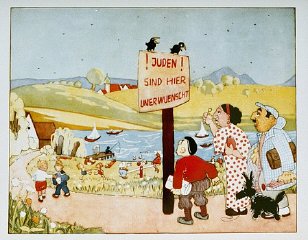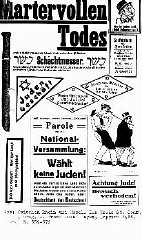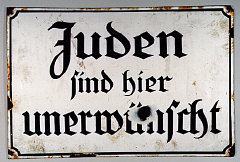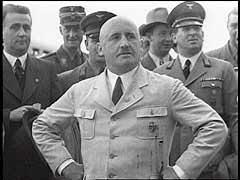Antisemitism

Illustration from an antisemitic children's primer. The sign reads "Jews are not wanted here." Germany, 1936.
— US Holocaust Memorial Museum
The specific hatred of Jews, however, preceded the modern era and the coining of the term antisemitism. Among the most common manifestations of antisemitism throughout history were pogroms, violent riots launched against Jews and frequently encouraged by government authorities. Pogroms were often incited by blood libels -- false rumors that Jews used the blood of Christian children for ritual purposes.
In the modern era, antisemites added a political dimension to their ideology of hatred. In the last third of the nineteenth century, antisemitic political parties were formed in Germany, France, and Austria. Publications such as the Protocols of the Elders of Zion generated or provided support for fraudulent theories of an international Jewish conspiracy. A potent component of political antisemitism was nationalism, whose adherents often falsely denounced Jews as disloyal citizens.
The nineteenth century xenophobic "voelkisch movement" (folk or people’s movement) -- made up of German philosophers, scholars, and artists who viewed the Jewish spirit as alien to Germandom -- shaped a notion of the Jew as "non-German." Theorists of racial anthropology provided pseudoscientific backing for this idea. The Nazi party, founded in 1919 and led by Adolf Hitler, gave political expression to theories of racism. In part, the Nazi party gained popularity by disseminating anti-Jewish propaganda. Millions bought Hitler's book Mein Kampf (My Struggle), which called for the removal of Jews from Germany.
With the Nazi rise to power in 1933, the party ordered anti-Jewish economic boycotts, staged book burnings, and enacted discriminatory anti-Jewish legislation. In 1935, the Nuremberg Laws racially defined Jews by “blood” and ordered the total separation of so-called "Aryans" and "non-Aryans,” thereby legalizing a racist hierarchy. On the night of November 9, 1938, the Nazis destroyed synagogues and the shop windows of Jewish-owned stores throughout Germany and Austria (an event now known as the Kristallnacht pogrom or Night of Broken Glass). This event marked a transition to an era of destruction, in which genocide would become the singular focus of Nazi antisemitism.
Taken from http://www.ushmm.org/wlc/en/article.php?ModuleId=10005175 : The United States Holocaust Memorial Museum
Resources
Burleigh, Michael. The Racial State: Germany 1933-1945. New York: Cambridge University Press, 1991.
Wistrich, Robert S. Antisemitism: The Longest Hatred. New York: Pantheon Books, 1991.
*****
Ben-Itto, Hadassa. The Lie That Wouldn't Die: The Protocols of the Elders of Zion. London: Vallentine Mitchell, 2005.
Levy, Richard S., editor. Antisemitism: A Historical Encyclopedia of Prejudice and Persecution. Santa Barbara, CA: ABC-CLIO, 2005.
Parkes, James W. Antisemitism. London: Valentine, Mitchell, 1963.
Poliakov, Leon. The History of Anti-Semitism. Philadelphia: University of Pennsylvania Press, 2003.




No comments:
Post a Comment